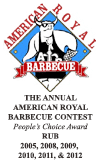Texas BBQ Rub |
|
The Texas BBQ Rub Tradition Continues Texas Wild was born as a rub to be used on wild game. Originally, the name was going to be Texas Wild Game Rub. The story did not end there... After working on the recipe for a few months, we introduced the Wild Game Rub at our Third Annual QFest in November 2006 to about 45 barbecue guys. We cooked bison briskets, coon, elk, wild hog, wild turkey, venison, and a few other game meats. Then, we decided to give the new rub a try on pork ribs, brisket, pork loin, and standing rib roast. Everyone loved the flavor of the new rub, but not just on the wild game we cooked. They also loved it on the traditional BBQ meats. They told me that I needed to change the name from Texas Wild Game to some other name, since the use of the name Wild Game may reduce the potential uses of the rub. So, we came up with the name Texas Wild. Some would say it should be called Texas Wow. |
|
Not Just for Wild Game Today, we have a lot of customers that use Texas Wild on all kinds of meat they cook. I love it on chicken and pork butts. I have a good customer that uses it in California on tri-tip roast and brisket. He has won a lot of trophies using it in competitions, and regularly uses it when he is serving tri-tip to his guests. He is not the only competition cooker using it on all kinds of meat with great success, so give it a try. The rub contains some large pieces of onion and garlic, as well as a special blend of seasonings, salts, and sugars. It is not as spicy hot as the name sometimes misleads people. It is a nice blend of some heat and sweet. Give it a try today! |
|
Use the simple 1-2-3 Formula Method of Applying the Rub TexasBBQRub - Old No. 2 Brisket Blend was designed just like our Original TexasBBQRub. You simply apply it using the simple 1-2-3 Formula. Simply cover your meat with Worcestershire sauce (or your favorite liquid), rub on Brisket Blend over the Worcestershire sauce until you get a nice gooey mixture on the meat, and then put the brisket or pork butt on the smoker. Cook at a low temperature for approximately 8 to 15 hours. |
|
|
|







